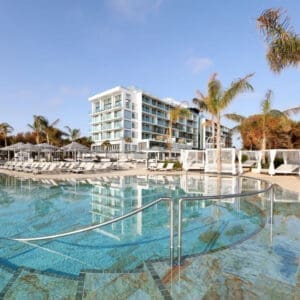 More than 95% of hotel property and investment professionals favour a remain outcome for next week’s UK EU referendum, according to a straw poll conducted amongst leading hotel professionals in London last week.
More than 95% of hotel property and investment professionals favour a remain outcome for next week’s UK EU referendum, according to a straw poll conducted amongst leading hotel professionals in London last week.
At the 2nd annual Market Connections event organised by hotel consultancy HVS, which ran simultaneously with similar gatherings at HVS offices around the globe, an audience of around 80 investors, operators and property developers expressed their views on the outcome. Very few of the attendees had changed their minds over their voting decision during the run-up to next week’s referendum vote.
The majority felt that the effect on the UK hotel sector would ultimately be neutral but pointed out concerns over the issue of finding enough staff of the right calibre to operate hotels if immigration were to be severely curtailed.
“The overwhelming feeling from our audience was that Britain should remain within the EU, not least because it removes huge uncertainties as to what will happen if there were a vote to leave,” said HVS London managing director Charles Human, who presented a positive outlook for the global hotel investment community, regardless of the referendum result.
Hotels, he said, represented the fastest growing category of property investment, rising 40% between 2013 and 2015 compared with non-hotel property investment up by 26%.
In 2015 some €25bn was spent on hotel real estate across Europe, compared with €14.4bn in 2014 while global hotel transaction volume rose by 61% to €73bn.
Human revealed that while the majority of the institutions and private equity companies investing in the European hotels market are based in Europe (43%) the strongest investment growth is currently stemming from Asia. Between 2007 and 2015 investment from Asia rose by a massive 1,262%, with investment from the Middle East seeing an 87% rise over the same period.
Investors from China, Singapore, Thailand and Hong Kong have emerged as the fastest growing, pushing total Asian investment in European hotel property up more than three-fold, from €1bn (Jan 2012 to June 2013) to €3.2bn (Jan 2015 to June 2016). Such organisations include the China National Travel Service, Fico Corporation and the Fraser Group.
While there has been much speculation that the UK, and in particular London, has reached the tip of its hotel property cycle with RevPAR (rooms revenue per available room) starting to slow, Human pointed out that demand for hotel property in London is still outpacing supply. London remains second in the top five most popular cities for hotel investors after New York, followed by Los Angeles, Hong Kong and Paris.
In the shorter term, Human pointed out that economic uncertainty combined with issues such as terrorism, the forthcoming US Presidential election and the Brexit vote has prompted a 60% decline in global hotel investment volume in the first quarter of 2016 and the year is expected to end with around €11bn-worth of investment, compared with €25.8bn-worth in 2015. However this is expected to improve as we move into 2017 albeit that next week’s referendum vote could slow some of this down.
Human ended the presentation with a comparison between the EU market and that of North America.
“The big difference between the two markets is that the value trend in Europe for hotel property is still on the up, whereas Q1 in North America showed a 5-8% decline. There are less favourable debt terms in North America and we are seeing RevPAR weakening in the major markets. Having said this, there is a sense of optimism returning, whereas until the outcome of Brexit next week there is continued uncertainty in the UK and Europe.”
Snapshot of hotel investment across Europe
* Dublin has shown the strongest RevPAR growth in Europe in the year to April at 23.2% (STR Global)
* Brussels has been the worst performing city this year with RevPAR down -13.3%
* Frankfurt has the highest level of hotels under construction or planned. Rome, Athens and Prague have the least amount of new hotel space coming on stream.
* Over half of new hotel supply in the pipeline is in the luxury or upscale sectors (51%)
* In the UK the majority of new supply (36%) is in the budget sector, with Belfast seeing the highest level of potential new construction.















